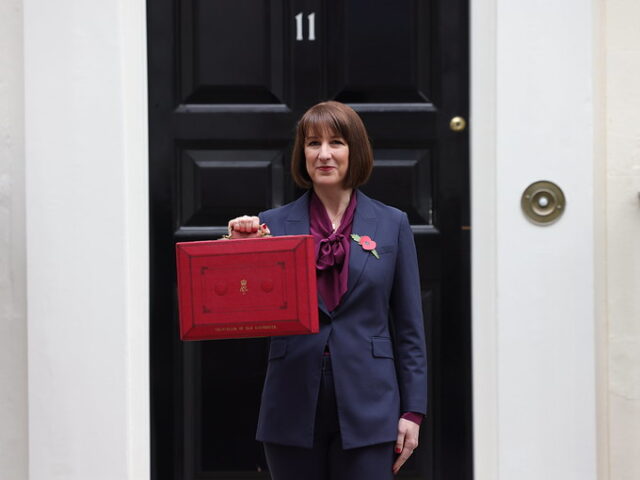Labour told the public as they sought election they would not “increase taxes on working people” if elected, but now one day after increasing taxes by £40 billion they have conceded ordinary people would be feeling the pinch after all.
The UK learnt what its new left-wing government would be doing on taxation, borrowing, and spending for the next year on Wednesday, with a historic £40 billion ($52bn) tax hike, the largest of modern times announced, putting the UK tax burden at the highest level in modern history. Yet political opponents and observers were quick to shred the Labour Chancellor Rachel Reeves over what they called broken promises, with one prominent Tory calling her a “compulsive liar”.
Among the measures announced was a considerable deepening of Employer’s National Insurance Contributions, which essentially amounts to a taxation on the privilege of having employees. Levied on all but the smallest of businesses, the tax now kicks in at a lower amount, and will be levied at a higher percentage, raising some £25 billion of the total £40 billion cash grab on its own.
Although the tax is paid by employers, critics make clear the ultimate victims of the hike will be employees themselves, as they experience the ultimate effect of a government decision to make employing people more expensive. In most cases, some economists have stated, this will be experienced as reduced future pay-rises, impacting the ability of workers to keep pace with inflation. In aggregate, it may lead to fewer jobs in the economy, meaning some of those impacted will experience the levy as finding it harder to get a job at all.
While this is bad enough on its own, those critics point out the sting is in the hypocrisy of the move, given Labour party promises.
While campaigning to win the UK general election earlier this year, Labour said clearly if elected workers would not see tax rises. They later refined this broad statement, shaving down what was protected by the ‘promise’ by redefining what constitutes a tax on working people, and even what constitutes a working person.
By subscribing, you agree to our terms of use & privacy policy. You will receive email marketing messages from Breitbart News Network to the email you provide. You may unsubscribe at any time.
Rachel Reeves, the tax-grabbing Chancellor who showed off the newly-hung portrait of a co-founder of the British Communist party in her Downing Street office this week shortly before delivering her budget acknowledged to some extent on Thursday morning the claims of her detractors. She told the BBC: “I said that it will have consequences. It will mean that businesses will have to absorb some of this through profits, and it is likely to mean that wage increases might be slightly less than they otherwise would have been.”
The Chancellor said: “I decided the right thing to do was to ask businesses, and to ask the wealthiest in our country to pay a bit more. They weren’t easy choices, and I do recognise that they will have consequences… I do recognise that all policies have consequences”.
The Conservative opposition, while not innocent in any of this and already experts on tax hikes themselves, nevertheless responded to Wednesday’s budget with howling fury. One Tory MP cited the Office for Budget Responsibility’s report to claim the tax hike will mean a £19 billion pay cut for British workers, and demanded an apology for broken election-time promises.
Robert Jenrick, one of two presently in the running to become the next Conservative Party leader called Reeves a “compulsive liar” after the budget. Harsh words, perhaps, but today is the last for voting to put him in the top job, so he’s looking for those final ballots. He said: “just three months ago the Labour Party won an election on a pledge not to raise taxes.
“I am afraid Rachel Reeves, who you have just interviewed, is acting like a compulsive liar. She said during the general election she wasn’t going to raise taxes. She just has. She said she wasn’t going to increase debt. She just massively increased debt.”
Kemi Badenoch, Jenrick’s rival in that race to be the next Tory leader and the bookies’ favourite also criticised the budget but in more guarded terms. She said: “The OBR has actually exposed immediately how they have chosen tax over growth. The OBR says 75 per cent of those employer NI rises will turn into lower wages.”
Perhaps the most difficult-to-overcome critic of Rachel Reeves in this matter will be her past self, however. As recently dug up, she previously harshly criticsed the Conservatives for planning to do just what she has done, warning hiking the tax on jobs would in fact act as a tax on working people. She said in parliament in October 2021: “… [employer’s tax] will make each new recruit more expensive and increase the costs to business.
“The decision to saddle employers and workers with the jobs tax takes money out of people’s pockets when our economic recovery is not yet established or secure and only adds to the pressure on businesses after a testing year and a half. When all other costs are going up—the costs of energy and of supplies—these tax rises are only hitting them harder”. Whoops!

COMMENTS
Please let us know if you're having issues with commenting.